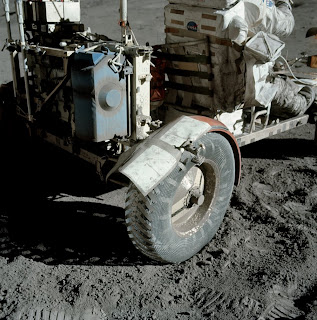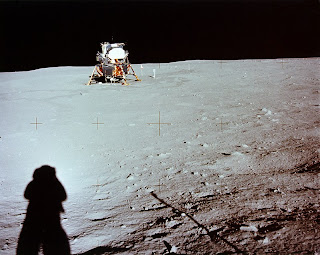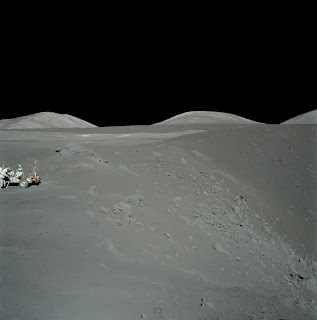I promised the readers of this blog some content each day over World Space Week, and I failed. All I ask is that you take it easy on me: I'm very new to this whole blogging thing. So what have I learned? Unless the content is already written or my full-time job is blogging, don't give date-specific promises. Due to Murphy's Law, stuff like work and school are bound to get in the way. Now I've learned.
On a more related note, I will shortly (see how I avoided a specific date? I'm learning!) write about the topics originally intended for World Space Week. These include tangible benefits of the space industry, why we need space science, and looking to the future. I also have a number of other topics I'd like to broach, but I'll save those for later.
Long story short, again I apologize for the broken promises. However, never fear. I still have plenty of material I'd like to share with you. Please feel free to engage in conversation in the comments of each post, whether you agree whole-heartedly or vehemently disagree. Thanks!
Saturday, October 13, 2007
Monday, October 8, 2007
Shame
Well, I didn't get around to posting on Monday. Work and homework and group projects got in the way. So, at the suggestion of a loyal reader, I added some hover comments to the pictures in my previous post. These captions should help out any lost readers.
Sunday, October 7, 2007
A Selection of Images
Saturday, October 6, 2007
Why We Need Space Exploration
Look up and tell me what you see. OK... bad idea. You're reading this on a computer, and so you're probably indoors. The next time you step outside, though, take a moment to ponder the limitless expanse above us. Assuming no clouds or trees block your view, you are essentially looking in a line trillions of miles long. Moving your head ever so slightly to one side, and you are looking down an entirely different line. Space basically goes forever, and the drive that brought Christopher Columbus to the Americas similarly drives us to venture into the unknown that is space.
If the ideal of exploration doesn't appeal to you, perhaps species survival will. I won't be so bold as to say that we are living on borrowed time, but chances are good that, in the long run, Earth will experience a catastrophic event. Asteroids, comets, volcanoes, and global warming all pose similar threats to human existence. Should something like this occur, the human species would do well to have inhabited other worlds.
Finally, we have the short-term benefits of such exploration. Already, we have seen many tangible benefits of space exploration, including GPS and satellite-based television. I will delve into these in a post later this week. There are many other areas where microgravity and orbiting the Earth may have an enormous impact: chemistry, materials science, biology, communication, the list goes on. Whereas our airplanes can simulate microgravity for sub-minute durations, building equipment in space adds a new dimension to microgravity science.
Yes, exploration is in our blood, as is survival. We also, however, have a giant laboratory above us. It would be a shame for us to forget about it. One of the many mandates of government is to pay for public works: projects that are simply too large of a burden for any single non-governmental entity to manage. As of now, using space exploration is one of these duties.
If the ideal of exploration doesn't appeal to you, perhaps species survival will. I won't be so bold as to say that we are living on borrowed time, but chances are good that, in the long run, Earth will experience a catastrophic event. Asteroids, comets, volcanoes, and global warming all pose similar threats to human existence. Should something like this occur, the human species would do well to have inhabited other worlds.
Finally, we have the short-term benefits of such exploration. Already, we have seen many tangible benefits of space exploration, including GPS and satellite-based television. I will delve into these in a post later this week. There are many other areas where microgravity and orbiting the Earth may have an enormous impact: chemistry, materials science, biology, communication, the list goes on. Whereas our airplanes can simulate microgravity for sub-minute durations, building equipment in space adds a new dimension to microgravity science.
Yes, exploration is in our blood, as is survival. We also, however, have a giant laboratory above us. It would be a shame for us to forget about it. One of the many mandates of government is to pay for public works: projects that are simply too large of a burden for any single non-governmental entity to manage. As of now, using space exploration is one of these duties.
Friday, October 5, 2007
Astronautic Achievements
The space programs around the world surely stand on the shoulders of giants. If not for the bravery and determination of the men and women before us, many of the space-related accomplishments that we take for granted simply would not have happened. Following is a short list of some of the most spectacular and world-changing astronauts of this short Space Age.
Yuri Gagarin
While many Americans may know that the Russians put a person in space before the US, they may not know that gentleman's name: Yuri Gagarin. On April 12, 1961, Yuri transformed the Space Age into the Manned Space Age. Oh, and he has a 130 foot monument made of titanium dedicated to him.
Gherman Titov
Mr. Titov is truly an inspiration to me. He was, and still is, the youngest person in space. On August 6, 1961, a 25 year-old Gherman spent just over a day orbiting the Earth.
Aleksei Leonov
Flying free is what Aleksei Leonov did that makes him special. Aleksei became the first person in human history to actually be in space. Without a ship around him, Aleksei spent 12 minutes in the presence of absolutely nothing. He then went on to command the Russian side of the very first US-USSR joint mission.
Neil Armstrong and Buzz Aldrin
We all know these two men were the first to land on the moon. For about one day, they were the only inhabitants of an entire world. Yes, the moon is smaller than the earth, but try thinking of it this way: Neil and Buzz were the only two people on an area larger than Europe, South America, and Australia, combined. Now that's desolation.
Georgi Dobrovolski, Viktor Patsayev, Vladislav Volkov
These three men were the first to inhabit a space station orbiting over 100 miles above the earth. They spent 23 days performing very meaningful scientific experiments that progressed our understanding of extended stays in microgravity. Those 23 days, however, proved to be these men's last, as their returning spacecraft accidentally vented all of its air during descent, suffocating the cosmonauts.
Bruce McCandless II
What Aleksei Leonov did, Bruce McCandless took to the next level. On February 7, 1984, Bruce became the first person to be completely freely floating in space sans tether. Utilizing a maneuvering unit that he helped design, McCandless ventured into the void of space on his own and came back, twice.
Yang Liwei
Proving that Russia and USA were not the only nations interested in spaceflight, China put Yang Liwei into orbit aboard the Chinese-designed and Chinese-launched spacecraft Shenzhou 5. Despite mission parameters that hearkened back to the US Gemini and Russian Vostok missions, Yang's flight on October 15, 2003 signified the entire world's desire to do what the US and Russia had been doing for decades: exploring the limits above us.
Mike Melvill
Melvill's mission was simple: get to space and come back. On June 21, 2004, he became the 443rd person to do so. Melvill, however, did this aboard a privately-built, privately-funded, and privately-launched spacecraft. No longer are the US and Russia in a race to get to space. The space race is now in the hands of the private industry.
I'm sorry to report that all of these record-setting astronauts are men. Yes, I could have listed the "First Woman in Space," but I think that belittles the issue at hand. Women simply haven't been given opportunities to beat out the men. Perhaps the first person to set foot on Mars will be a woman.
Yuri Gagarin
While many Americans may know that the Russians put a person in space before the US, they may not know that gentleman's name: Yuri Gagarin. On April 12, 1961, Yuri transformed the Space Age into the Manned Space Age. Oh, and he has a 130 foot monument made of titanium dedicated to him.
Gherman Titov
Mr. Titov is truly an inspiration to me. He was, and still is, the youngest person in space. On August 6, 1961, a 25 year-old Gherman spent just over a day orbiting the Earth.
Aleksei Leonov
Flying free is what Aleksei Leonov did that makes him special. Aleksei became the first person in human history to actually be in space. Without a ship around him, Aleksei spent 12 minutes in the presence of absolutely nothing. He then went on to command the Russian side of the very first US-USSR joint mission.
Neil Armstrong and Buzz Aldrin
We all know these two men were the first to land on the moon. For about one day, they were the only inhabitants of an entire world. Yes, the moon is smaller than the earth, but try thinking of it this way: Neil and Buzz were the only two people on an area larger than Europe, South America, and Australia, combined. Now that's desolation.
Georgi Dobrovolski, Viktor Patsayev, Vladislav Volkov
These three men were the first to inhabit a space station orbiting over 100 miles above the earth. They spent 23 days performing very meaningful scientific experiments that progressed our understanding of extended stays in microgravity. Those 23 days, however, proved to be these men's last, as their returning spacecraft accidentally vented all of its air during descent, suffocating the cosmonauts.
Bruce McCandless II
What Aleksei Leonov did, Bruce McCandless took to the next level. On February 7, 1984, Bruce became the first person to be completely freely floating in space sans tether. Utilizing a maneuvering unit that he helped design, McCandless ventured into the void of space on his own and came back, twice.
Yang Liwei
Proving that Russia and USA were not the only nations interested in spaceflight, China put Yang Liwei into orbit aboard the Chinese-designed and Chinese-launched spacecraft Shenzhou 5. Despite mission parameters that hearkened back to the US Gemini and Russian Vostok missions, Yang's flight on October 15, 2003 signified the entire world's desire to do what the US and Russia had been doing for decades: exploring the limits above us.
Mike Melvill
Melvill's mission was simple: get to space and come back. On June 21, 2004, he became the 443rd person to do so. Melvill, however, did this aboard a privately-built, privately-funded, and privately-launched spacecraft. No longer are the US and Russia in a race to get to space. The space race is now in the hands of the private industry.
I'm sorry to report that all of these record-setting astronauts are men. Yes, I could have listed the "First Woman in Space," but I think that belittles the issue at hand. Women simply haven't been given opportunities to beat out the men. Perhaps the first person to set foot on Mars will be a woman.
Thursday, October 4, 2007
Twice Over, or Happy Birthday Sputnik
Fifty years. That's the entirety of my life, twice over. Eighteen thousand two hundred sixty two days have passed since Sputnik I advanced the human race from mere aviators into explorers of the infinite. What, precisely, has happened to us in the intervening years?
We have, I'm sorry to say, lost our ambition for space. I'm told that Americans in the late 1950s became awestruck at the faint radio signal emanating from Sputnik's antennae. There was a palpable sense of national urgency to "beat the Russians." That spirit began its ascension with the creation of NASA, continued with the rock-star-like Mercury Seven, and climaxed with Apollo 11's landing on the Moon. It took only twelve years to go from Russia's first step into space to America's first step on the Moon.
Since those days, however, the idea of space has faded into obscurity. Despite repeated launches over the years, the names and visages of today's astronauts, cosmonauts, and taikonauts are completely invisible to the public eye. Why do we continue to give copious amounts of screen time to the likes of Paris Hilton and Flavor Flav? Instead, it seems that the only requirement for attention to space activities is loss of life.
My intent is to break this mold. The first step for me is to publicize my astronaut application process through this blog. Once selected for duty, I will continue updating this blog, but I will also try to reach out to the most important people in the space program: children with dreams. They are responsible for the next fifty years. I hope that by the time my body is accelerating at a terrifying pace towards the dark void of space, the world will once again look up in awe. Garnering a scant 15 second clip on a cable news station would be a greater failure than not making it into the astronaut program.
OK. Time for me to get off my soapbox. I encourage you to read tomorrow's entry, where I will pay homage to some of the past astronauts.
We have, I'm sorry to say, lost our ambition for space. I'm told that Americans in the late 1950s became awestruck at the faint radio signal emanating from Sputnik's antennae. There was a palpable sense of national urgency to "beat the Russians." That spirit began its ascension with the creation of NASA, continued with the rock-star-like Mercury Seven, and climaxed with Apollo 11's landing on the Moon. It took only twelve years to go from Russia's first step into space to America's first step on the Moon.
Since those days, however, the idea of space has faded into obscurity. Despite repeated launches over the years, the names and visages of today's astronauts, cosmonauts, and taikonauts are completely invisible to the public eye. Why do we continue to give copious amounts of screen time to the likes of Paris Hilton and Flavor Flav? Instead, it seems that the only requirement for attention to space activities is loss of life.
My intent is to break this mold. The first step for me is to publicize my astronaut application process through this blog. Once selected for duty, I will continue updating this blog, but I will also try to reach out to the most important people in the space program: children with dreams. They are responsible for the next fifty years. I hope that by the time my body is accelerating at a terrifying pace towards the dark void of space, the world will once again look up in awe. Garnering a scant 15 second clip on a cable news station would be a greater failure than not making it into the astronaut program.
OK. Time for me to get off my soapbox. I encourage you to read tomorrow's entry, where I will pay homage to some of the past astronauts.
Monday, October 1, 2007
Coming Up
This Thursday, October 4, marks the beginning of World Space Week. As a result, I will share a post with you each day. Get excited!
Subscribe to:
Comments (Atom)







